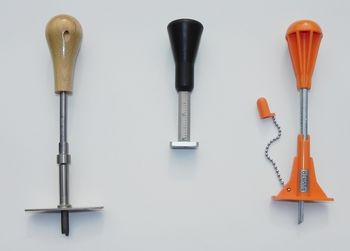Bark thickness

The thickness of bark and its percentage of volume of the tree or log are important attributes in forest mensuration because most measurements on standing tree have to be made ‘over bark’. However, in many countries, the bark thicknesses are relatively well known and are integrated as constant factors into volume calculation so that bark thickness is rarely measured. However, in many regions, bark is a major non-wood forest product (NWFP) for various purposes (medicine, spices).
Bark thickness varies with species, age, rate of growth, and position at the tree. Usually the bark is thicker at the base of the tree and thinnest in the crown. In a similar way, the volume of the bark accumulation may differ from fast growing species to slow growing species. The bark thickness of living tree may be measured with little damage to the tree using a bark gauge (Figure 1).
References
- ↑ Kleinn, C. 2007. Lecture Notes for the Teaching Module Forest Inventory. Department of Forest Inventory and Remote Sensing. Faculty of Forest Science and Forest Ecology, Georg-August-Universität Göttingen. 164 S.